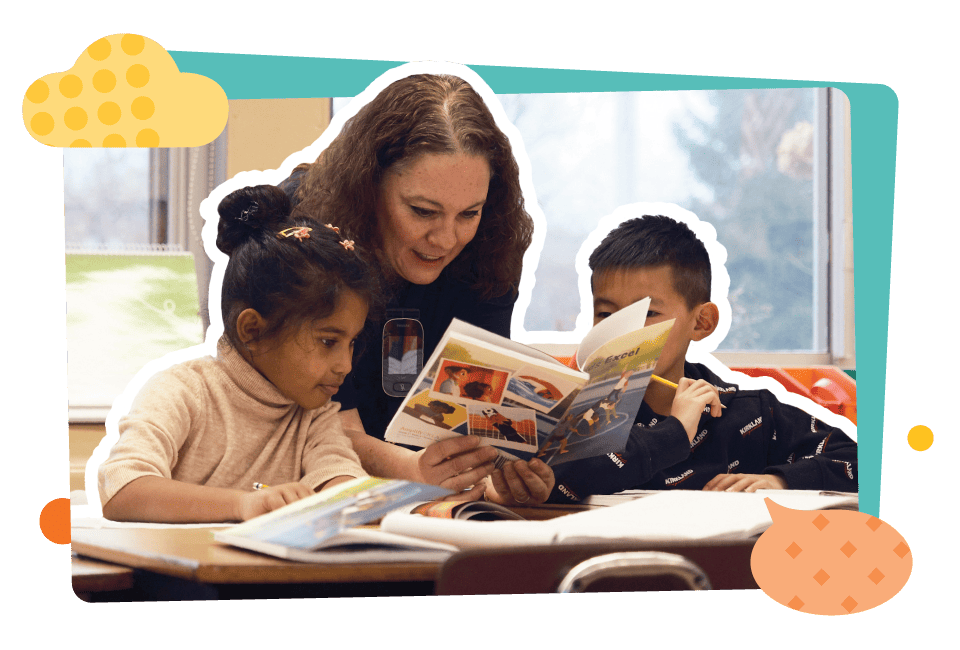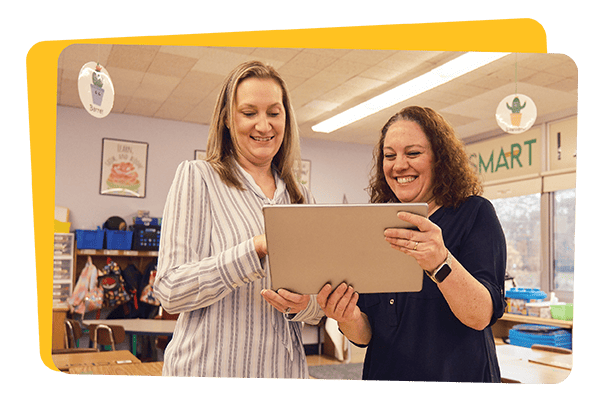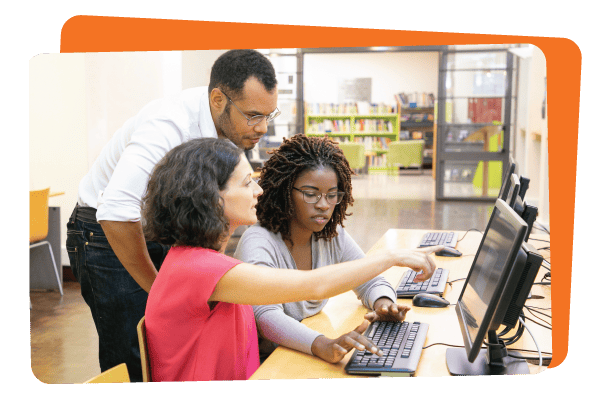Prepare Professional Development (PD)
Learning experiences to prepare for literacy and math instructional shifts
Prepare learning experiences are your key to unlocking effective instructional transformation. Our dynamic literacy and math sessions are crafted to enhance teaching methods, irrespective of your current programs. Take a step toward success today with:
- Science of Reading sessions offering research-backed strategies to deepen understanding and improve student ąú˛úČýĽ¶Ć¬.
- Problem-based approach to math sessions that empowers educators to facilitate meaningful learning experiences and develop critical thinking skills.
Contact us

Professional learning journey
—

Prepare |
Begin |
Practice |
Advance |
| Learning sessions will help shift literacy and math instruction in areas such as the Science of Reading and/or problem-based approaches to math. | Program-aligned packages will support those who are new to Amplify programs. | Program-aligned packages will support those who have experience using Amplify programs. | Offerings will support advanced implementation, build capacity for instructional leaders, certify in-house trainers to deliver Launch sessions, and more. |
Science of Reading learning experiences
Listening to students read is magic. But knowing how to get them reading? That’s science.
Making the shift to the Science of Reading is no small feat, but participating in professional development sessions can help you make this change seamlessly.
Amplify Science of Reading sessions offer flexible, professional learning experiences for teachers that incorporate engaging activities grounded in what science tells us about literacy development.


Build your knowledge of the Science of Reading
Virtual | 90-minute session
This introductory session provides educators with a foundational overview of what the Science of Reading means and what it tells us about how to teach, using evidence-based reading practices.
Participants will learn to:
- Define the Science of Reading by examining evidence-based research.
- Explain how two frameworks, the Simple View of Reading and the Reading Rope, work in tandem to guide effective literacy instruction.
- Identify instructional principles aligned to the Science of Reading.
Contact us to request a quote.

Deepen your knowledge of the Science of Reading
On-site or virtual | 3-hour session
This session will build a base of common knowledge about the Reading Rope and support educators in identifying effective instruction grounded in the Science of Reading.
Participants will learn to:
- Identify the strands in the Reading Rope.
- Describe how each strand plays an important role in developing skilled readers and writers.
- Identify key look-fors in effective Science of Reading instruction.
Contact us to request a quote.
Science of Reading: The Learning Lab online courses
This series of three self-paced online courses, crafted by literacy expert Susan Lambert and built around International Dyslexia Association (IDA) Knowledge and Practice Standards, guides you through the essential Science of Reading skills and knowledge needed to teach students to read proficiently, as well as advanced strategies for aiding struggling readers. Each course builds on the last, equipping you with the tools and confidence to make a lasting impact on your students’ literacy journeys.Ěý
Benefit from flexible learning on an interactive platform, spanning 20–25 hours of instruction. Each course is accessible for 12 months. Upon completion, you’ll be provided with a downloadable certificate, validating your new expertise in the Science of Reading.

Foundations to the Science of Reading
This course offers a comprehensive overview of research in the field. Each of the eight modules contains three lessons covering the foundations of literacy acquisition.
Explore the scope and sequence of Foundations to the Science of Reading with a Pacing Guide.
Access the free for this course.

Advanced Topics in the Science of Reading: Assessment and Reading Difficulties
The second course is aimed at providing an in-depth examination of assessments, a deeper understanding of reading difficulties, and familiarity with pertinent legal frameworks for educators, all of which influence instructional decision-making.
Explore the scope and sequence of Advanced Topics in the Science of Reading with our Pacing Guide.Ěý
Access the free for this course.

COMING SOON!
Applied Structured Literacy
The final course in the series is designed to develop educators’ ability to apply effective literacy instruction to their classroom practices.
[AVAILABLE FEBRUARY 2025]
Problem-based approach to math instruction sessions
Elevate educational experiences by placing students’ ideas at the core of math lessons through problem-based learning. These sessions offer flexible professional learning experiences, allowing you to gain firsthand experience with a problem-based approach as a learner. You then learn to integrate this approach seamlessly into your teaching practices, bringing renewed energy to your math classroom.

Build your knowledge of a problem-based approach
Virtual | 90-minute session
This session provides you with a foundational overview of what an engaging problem-based approach in math entails for ąú˛úČýĽ¶Ć¬“5 students.
During this session you’ll learn to:
- Explain how a problem-based approach to math brings delight to both teaching and learning and builds lasting student understanding.
- Identify actionable strategies for using a problem-based approach in a math classroom.
Contact us to request a quote.

Deepen your knowledge of a problem-based approach
On-site or virtual | 3-hour session
This session provides you with hands-on experience facilitating problem-solving in math, leaving you with an increased understanding of how to teach conceptual understanding, procedural skill and fluency, and applications of math.
During this session you’ll learn to:
- Explain how a problem-based approach to math brings delight to both teaching and learning and builds lasting student understanding.
- Identify actionable strategies for using a problem-based approach in a math classroom.
- Connect current teaching practice to a problem-based approach, and choose a next step to implement a more problem-based approach.
Contact us to request a quote.


